Comprehensive Guide to Google Ads for Divorce Attorneys
Learn how attorneys can leverage Google Ads to grow their law firm from a Certified Google Partner marketing agency.
Introduction to Google AdWords for Divorce Attorneys
In the competitive landscape of divorce law, leveraging Google AdWords, now known as Google Ads, can be a game-changer for attorneys seeking to attract new clients. As an introduction to this powerful tool, it’s essential to understand that Google Ads offers divorce lawyers a direct pathway to connect with potential clients at the exact moment they are seeking legal assistance. By strategically bidding on relevant keywords, such as “divorce attorney near me” or “best divorce lawyer,” attorneys can ensure their services are prominently displayed in Google search results. This targeted approach not only increases visibility but also significantly enhances the likelihood of attracting clients who are in immediate need of legal services. Google Ads allows for a high degree of customization and control, from setting daily budget limits to selecting specific geographic areas, making it a highly efficient marketing investment for divorce lawyers aiming to grow their practice. Through this platform, attorneys can craft compelling ads that speak directly to the needs and concerns of their prospective clients, making it an indispensable tool for those looking to thrive in today’s digital age.
The Importance of PPC and SEO Integration for Divorce Lawyers
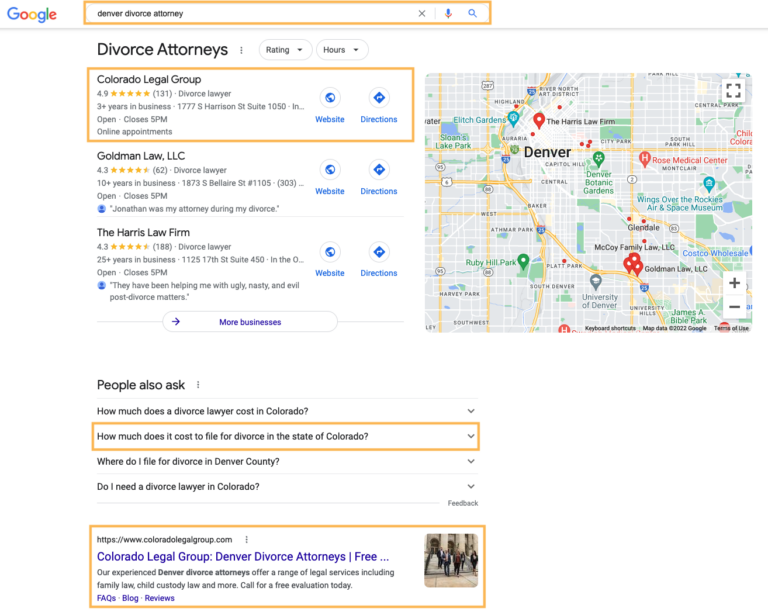
For divorce lawyers, integrating Pay-Per-Click (PPC) advertising with Search Engine Optimization (SEO) strategies is crucial for maximizing online visibility and attracting more qualified leads. PPC campaigns through platforms like Google Ads can provide immediate visibility in search engine results, allowing attorneys to appear at the top of the page for highly competitive keywords. On the other hand, SEO focuses on improving organic search rankings through optimized content and website performance, which builds credibility and trust over time. By combining both PPC and SEO, divorce attorneys can dominate both paid and organic search results, ensuring a comprehensive presence that caters to potential clients at various stages of the decision-making process. This dual strategy not only enhances the likelihood of being found by those in need of legal services but also provides a cost-effective balance between immediate results and long-term sustainability. Moreover, the data gathered from PPC can inform divorce attorney SEO strategies, offering insights into effective keywords and user behaviors, which can further refine and improve your overall marketing efforts.
Best Practices for Family Law Digital Advertising
To effectively reach and convert potential clients through digital advertising, family law attorneys must employ a series of best practices. These practices optimize campaigns and enhance user engagement, ultimately leading to higher conversion rates and a better return on investment.
Identifying and Understanding Your Target Audience
The first step in any successful digital advertising campaign is to identify and understand your target audience. For family law, this could include individuals contemplating divorce, seeking custody arrangements, or requiring mediation services. Demographic details such as age, gender, geographical location, and even certain behavioral characteristics can define your audience. Understanding the emotional and legal needs of these groups helps in tailoring your messages and strategies to resonate with them deeply, increasing the relevance and effectiveness of your ads.
Selecting the Most Effective Family Law PPC Keywords
Keyword selection is critical in PPC campaigns. For family law attorneys, this means choosing keywords that prospective clients are likely to use when seeking legal services. Broad terms like “divorce lawyer” or “family law attorney” are essential but combining them with more specific keywords related to your services (such as “child custody attorney” or “high net worth divorce lawyer”) can attract more qualified leads. Incorporating local keywords, such as including city or county names, also helps in attracting clients within your geographical area who are more likely to engage your services. Be careful with service terms like “child support attorney” and “alimony lawyer.” While relevant, this could be an indicator that the prospect is already facing financial hardship making them less able to afford your representation.
Writing Engaging Ad Copy for Family Law
The ad copy should speak directly to the needs and emotions of potential clients. It’s important to convey empathy and understanding, as well as professionalism and expertise. Your ad copy should clearly state what you offer, how you can help, and what sets you apart from other family law attorneys. Calls to action should be clear and compelling, urging potential clients to learn more, contact your office, or schedule a consultation. Using actionable language and maintaining a respectful tone considering the sensitive nature of family law matters is crucial.
Building Dedicated Landing Pages for Campaigns
Landing pages play a pivotal role in converting visitors into clients. Each landing page should be directly relevant to the ad that brought the visitor there, providing detailed information aligned with what was advertised. For family law, pages might detail your experience with specific cases, client testimonials, or the outcomes of typical case scenarios. The design of these pages should be clean with a clear call to action, such as filling out a contact form or calling your law office. Make sure these pages are mobile-friendly, as many users will access them via their smartphones.
Implementing A/B Testing to Refine Ad Strategies
A/B testing is essential for optimizing digital advertising campaigns. By creating two versions of an ad or landing page and testing them against each other, you can see which elements perform better and make data-driven decisions about content, design, and strategy. For family law, you might test different headlines, images, or calls to action to see what resonates best with your audience. This ongoing process of testing and refinement helps maximize the effectiveness of your advertising spend and improves overall campaign performance.
Mastering Keyword Selection for Divorce Law PPC
Selecting the right keywords is fundamental for the success of any PPC campaign, especially for divorce lawyers aiming to attract clients in a highly competitive market. Keywords act as the bridge connecting potential clients’ queries to your legal services. Here, we’ll explore how to effectively choose keywords that can significantly enhance the performance of your PPC campaigns, focusing on attorney geographic keywords and specific divorce case keywords.
Attorney Geographic Keywords
Geographic targeting is crucial for local SEO and PPC strategies, particularly for law practices like divorce law that typically serve clients in specific locales. Keywords such as “divorce attorney in [City Name]” or “family lawyer near me” help capture the local audience actively seeking legal assistance in their area. Partnering geographic keywords with location targeting utilizing ZIP codes and cities ensuring your ads appear to the most relevant audience. This localized approach not only increases ad relevance but also improves click-through and conversion rates as prospective clients often prefer local legal counsel.
Specific Divorce Case Keywords
Keywords related to specific aspects of divorce cases that your firm specializes in are essential for targeting. Keywords such as “mediation attorney,” “child custody lawyer,” or “military divorce law specialist” help attract clients with specific legal needs, which can lead to higher engagement rates. Tailoring your keyword strategy to include various divorce scenarios and concerns—like “asset division lawyer” or “quick divorce proceedings”—ensures that your ads reach individuals seeking precise legal services. This method not only narrows down the competition but also positions your firm as a specialist, which can significantly influence decision-making for potential clients.
The Role of Negative Keywords in Optimizing Ad Spend
The role of negative keywords in a PPC campaign is critical for optimizing ad spend and enhancing the effectiveness of your advertising efforts, particularly for divorce lawyers. Negative keywords prevent your ads from being triggered by searches that are not relevant to your services, ensuring that your ad budget is spent on users who are more likely to convert into clients. For example, if a divorce attorney wants to avoid attracting traffic that’s looking for free legal advice, adding terms like “free” or “pro bono” as negative keywords can help filter out such undesirable queries. This strategy not only reduces wasted ad spend by excluding irrelevant searches but also improves campaign metrics like click-through rate (CTR) and conversion rate by targeting a more precise audience. Consequently, by judiciously using negative keywords, divorce attorneys can ensure that their PPC campaigns are more focused, cost-effective, and aligned with their client acquisition goals.
Strategies for Effective Ad Targeting and Retargeting
Effective ad targeting and retargeting are pivotal strategies for divorce attorneys looking to maximize the impact of their PPC campaigns. Here’s how these techniques can significantly improve your advertising efforts:
- Ad Targeting: This involves defining the audience you want to reach based on specific demographics, interests, and behaviors. By focusing on factors such as geographical location, household income, age, and gender, you ensure that your ads are shown to those most likely to need your services. This precision not only increases the relevance of your campaigns but also enhances their efficiency.
- Retargeting: Focuses on re-engaging individuals who have interacted with your website but did not convert. Using Google Tag Manager to create a remarketing tag and Google Ads audience feature, this method reminds prospects of your services, enhancing the chances of conversion.
By employing both targeting and retargeting, divorce attorneys can create a comprehensive marketing approach. This strategy reaches a broad audience and reinforces your message to potential clients who are already familiar with your firm, significantly increasing the likelihood of client acquisition and optimizing overall ad spend.
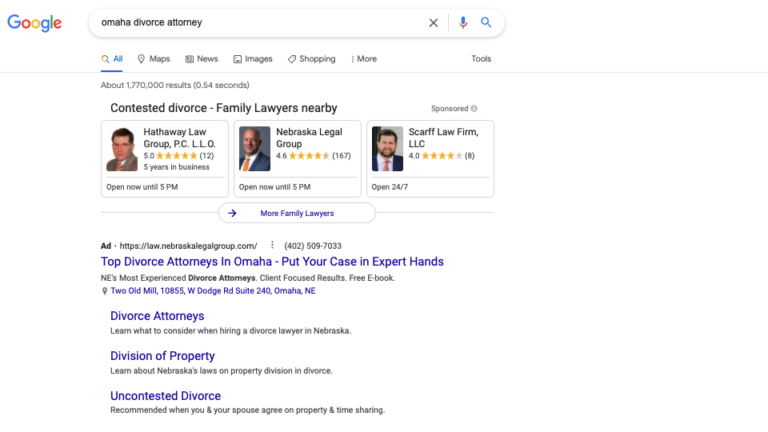
Crafting Compelling Ad Copy for Divorce Attorneys
Crafting compelling ad copy for divorce attorneys is essential to engage potential clients and drive conversions. The key is to empathize with the emotional and practical needs of individuals facing divorce while reflecting an understanding and professional assurance in your messaging. Effective ad copy should highlight your unique selling propositions. Use action-oriented language that encourages immediate response, such as “Schedule a Free Consultation Today” or “Protect Your Rights with Expert Legal Help.”
The Components of Google Search Ads: Setting Up Your Ads for Success
Headlines
Extensions
Descriptions
Sitelinks
Designing High-Converting Landing Pages for Legal Services
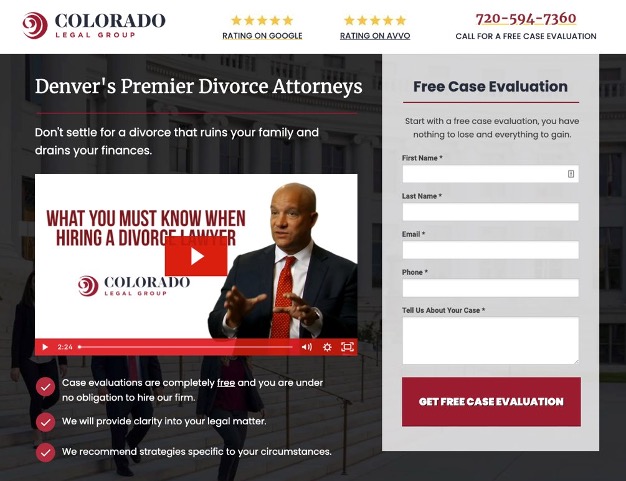
Designing high-converting landing pages for legal services requires a strategic approach that focuses on clarity, credibility, and user engagement. The goal is to create a page that not only attracts potential clients but also persuades them to take action, such as filling out a contact form or making a phone call. Key elements include a clear and compelling headline that directly addresses the visitor’s needs or concerns, followed by succinct, persuasive content outlining the benefits of your services. Testimonials, case studies, and professional accreditations can significantly enhance credibility, reassuring visitors of your expertise and successful track record. Responsive design is crucial, as most users will access your site from mobile devices. Fast load times, clear contact information, and easy-to-use forms are essential components that can dramatically increase conversion rates on legal services landing pages. We personally recommend using Unbounce for a landing page builder.
Optimizing Your Website for Google Ads Success
Optimizing your website for Google Ads success is crucial to maximize the ROI of your advertising efforts. This process involves ensuring that your website is fully aligned with your Google Ads campaigns in terms of content, keywords, and user experience. Start by enhancing the relevance of your landing pages — make sure that the content on these pages closely matches the keywords and ad copy in your campaigns. This relevance not only improves your Quality Score in Google Ads, reducing your cost per click but also increases the likelihood of conversion by delivering a cohesive user experience. Additionally, improve your website’s loading speed as this can significantly impact both ad performance and bounce rates. Use tools like Google PageSpeed Insights to identify and rectify any speed issues. Furthermore, your website should be optimized for mobile users, considering that a substantial portion of web traffic comes from mobile devices. Finally, include clear, persuasive calls-to-action on your landing pages and ensure that tracking is in place to measure the performance of your ads accurately. This will enable you to refine your campaigns based on concrete data, continually enhancing your strategy for better results.
Budgeting Tips for Family Law Google Ads Campaigns
Effective budgeting is essential in running successful PPC campaigns for family law. By allocating the right amount of funds and managing them wisely, law firms can maximize their return on investment, reach the intended audience, and gain new clients without overspending.
How Much Should a Law Firm Spend on Google Ads?
Determining the right budget for Google Ads in family law hinges on several factors, including the firm’s financial resources, the competitiveness of the market, and specific campaign goals. Generally, there is no one-size-fits-all answer, but there are some guidelines to help set a sensible budget:
Market Research
Business Needs
Market Share
ROI
Essential PPC Metrics for Family Law Firms
For family law firms utilizing PPC advertising, monitoring essential metrics is crucial to assess the effectiveness of campaigns and guide data-driven decisions. These key performance indicators (KPIs) provide critical insights into campaign performance:
- Impression Share (IS): Is the percentage of impressions that your ads receive compared to the total number of impressions that your ads could get. Impression share = impressions / total eligible impressions.
- Click-Through Rate (CTR): This measures the percentage of people who click on your ads after viewing them. A higher CTR indicates that your ads are relevant and engaging to your target audience.
- Cost per Click (CPC): This metric helps manage the budget by showing the cost for each click on your ads. It’s essential for assessing the financial efficiency of your targeted keywords.
- Conversion Rate: Indicates the percentage of clicks that result in the desired action (e.g., form submissions, phone calls). This metric is vital for evaluating the effectiveness of your landing pages and ad targeting.
- Cost per Acquisition (CPA): Crucial for understanding the actual cost involved in acquiring a new client, this metric helps determine the true return on investment of your PPC efforts.
- Quality Score: Affects your ad position and CPC. Monitoring this score provides insights into the overall health of your account, reflecting factors like ad relevance, click-through rates, and landing page quality.
By regularly analyzing these metrics, family law firms can optimize their PPC strategies, enhancing campaign performance and achieving more effective client acquisition and retention.
Utilizing Call Tracking and Conversion Optimization
Implementing call tracking and conversion optimization is crucial for divorce attorneys to accurately measure the effectiveness of their PPC campaigns and refine their marketing strategies for maximum impact. Call tracking allows firms to attribute phone calls directly to specific ads, providing clear insights into which keywords and ad placements are driving valuable client interactions. This data is essential for understanding the customer journey and identifying the touchpoints that lead to conversions. Moreover, integrating this information with conversion optimization efforts enables attorneys to fine-tune their ads, landing pages, and overall messaging to enhance the user experience and increase conversion rates. By analyzing patterns in the calls received and continuously testing different elements of their campaigns, divorce attorneys can significantly improve their ROI, ensuring that their marketing budget is invested in the most impactful strategies. This approach not only helps in optimizing ad spend but also in crafting a user experience that directly addresses the needs and concerns of potential clients, leading to higher engagement and better client acquisition rates. We use CallRail for our own law firms’ call tracking and recommend them for our clients as well.
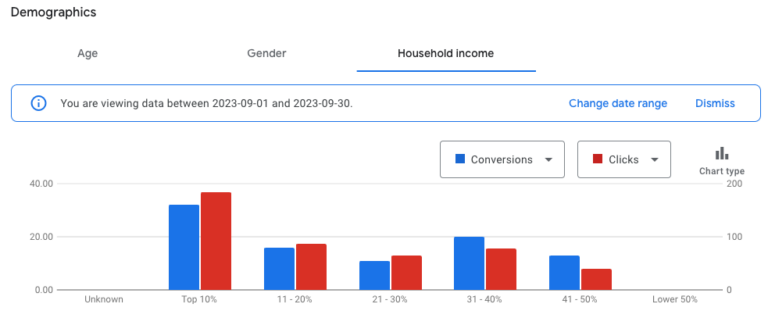
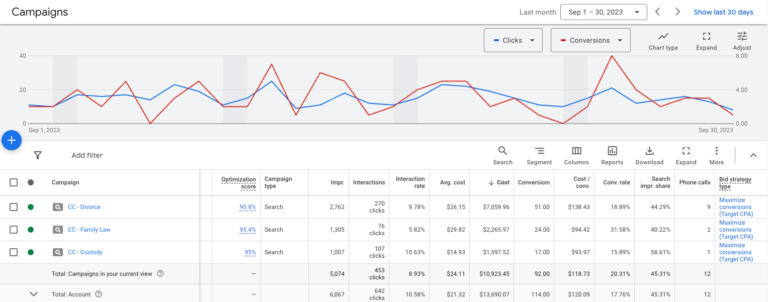
Case Study: Successful Google Ads Campaigns for Divorce Lawyers
We were hired by a newly established boutique family law practice in Austin, Texas. The three founding partners brought existing casework from their previous employment but aimed to enhance and expand their caseload through targeted advertising. They also planned to grow their practice by hiring associates who would predominantly depend on marketing-driven client acquisition rather than referrals.
The firm started with a PPC budget of $7,500, which positioned them competitively in the market right from the outset. Once their account moved beyond Google’s initial learning phase, the US Legal Marketing Group search engine marketing team implemented several optimizations. These strategic adjustments allowed us to significantly expand their marketing efforts and grow their practice. The firm now boasts five additional associates, supported largely through our focused and strategic campaign structures and bidding strategies. Notably, targeting the top 10% of household incomes proved to be a highly effective tactic, achieving both broad reach and cost-effective CPCs. This case exemplifies the impact of well-executed PPC strategies in building and scaling a law practice.
Where They've Scaled Their Google Ads Account To in 2024
$15,000 Budget
19% Conversion Rate
$27 CPC
100+ Conversions Per Month
Legal Advertising Ethics and Compliance in PPC
Navigating the complexities of ethics and compliance is crucial for any law firm engaging in PPC advertising. Legal professionals must adhere to stringent guidelines set by both national and local bar associations to ensure their advertising practices do not violate professional standards. This includes maintaining honesty and accuracy in every ad, avoiding misleading information or unrealistic promises about outcomes. Additionally, attorneys must be transparent about their identity as legal professionals in their advertisements.
It is also essential for law firms to respect client confidentiality in their digital marketing efforts. Any use of client information or endorsements in advertisements should strictly follow the ethical guidelines regarding client privacy and consent. Furthermore, PPC ads must be clearly distinguished from legal advice, ensuring that potential clients understand that clicking an ad or interacting with a landing page does not establish a lawyer-client relationship.
For law firms, compliance also means regularly reviewing and updating advertising practices to align with evolving ethical standards and regulations. This might involve ongoing training for marketing teams and regular audits of PPC campaigns to guarantee that all content is appropriate and ethical. By prioritizing ethical considerations and compliance, law firms not only protect themselves legally and professionally but also build trust with potential clients, enhancing their reputation and efficacy in digital marketing spaces.
Future Trends in PPC for Family Law Firms
As digital marketing continues to evolve, family law firms must stay ahead of emerging trends in PPC to remain competitive and effective in their advertising efforts. One significant trend is the increasing use of artificial intelligence (AI) and machine learning technologies to optimize PPC campaigns. These tools can analyze vast amounts of data to predict user behavior, adjust bidding strategies in real time, and personalize ads to individual users’ interests and needs, leading to higher conversion rates.
Another trend is the growing importance of voice search optimization. With more people using voice-activated devices to seek legal advice, family law firms will need to adapt their keywords and content to be more conversational and question-based to capture this audience.
Additionally, video ads are expected to gain prominence within PPC for family law. Video provides a powerful medium to convey empathy and build trust, which are crucial in attracting clients dealing with sensitive family issues. Platforms like YouTube and social media channels are ideal for deploying these types of ads to engage potential clients effectively.
The integration of PPC with other digital marketing strategies like social media and SEO will also become more pronounced. This holistic approach ensures a unified message across all channels, improving brand consistency and boosting overall marketing effectiveness.
Lastly, transparency and privacy will continue to be major concerns for clients. Family law firms will need to ensure that their PPC campaigns are not only effective but also adhere strictly to privacy laws and regulations, providing clear information on data usage and gaining trust through transparency.
By keeping an eye on these trends and incorporating them into their PPC strategies, family law firms can enhance their online presence and continue to attract and convert clients effectively in a rapidly changing digital landscape.
Getting Started with Google Ads: Tips and Promotions
Embarking on a Google Ads journey can be transformative for family law firms looking to drive targeted traffic and attract new clients. Here are several essential tips and promotional strategies to effectively launch and manage your Google Ads campaigns:
- Understand Your Objectives: Clearly define what you want to achieve with your Google Ads. Whether it’s increasing website visits, generating more phone calls, or driving specific actions like form submissions, having clear objectives will guide your campaign structure and bidding strategies.
- Keyword Research: Invest time in thorough keyword research. Identify terms that your potential clients are searching for, including specific phrases related to family law services such as “divorce attorney near me” or “child custody lawyer in [City].” Utilize tools like Google Keyword Planner for insights into search volumes and competition levels.
- Set Up Structured Campaigns: Organize your Google Ads account with well-structured campaigns and ad groups that are segmented by service types or client needs. This organization helps in managing the campaigns more effectively and allows for more targeted ad copy and landing pages.
- Optimize Landing Pages: Ensure that your landing pages are optimized for conversion. They should be relevant to the ad copy, load quickly, be mobile-friendly, and include clear calls to action (CTAs) such as phone numbers or contact forms.
- Track and Measure: Set up conversion tracking from the start. This enables you to measure the effectiveness of your ads and understand your return on investment (ROI). Google Ads provides tools to track actions like form submissions, phone calls, and even chat interactions.
- Adjust and Optimize: Regularly review your campaign performance. Look at metrics such as click-through rate (CTR), cost per click (CPC), and conversion rate. Use this data to refine your ads, adjust your bids, and even pause underperforming keywords.
- Stay Informed: PPC advertising is always evolving. Stay updated with Google Ads updates, new features, and best practices by subscribing to digital marketing newsletters, attending webinars, and participating in relevant forums.
- Free eBook Download: Our own legal industry insider and Google Certified marketer shares what truly optimized pay-per-click campaigns look like and what they can do for your own practice. Download The Undefeated Playbook to Google Ads for Attorneys.
By following these tips and leveraging available promotions, family law firms can effectively kick-start their Google Ads campaigns, attracting more qualified leads and expanding their client base.
Work With US Legal Marketing Group, A Certified Google Ads Partner
By partnering with US Legal Marketing Group, your divorce law firm can harness the power of advanced PPC strategies developed by legal professionals for legal professionals. Experience the difference that expert-led marketing can make in transforming your practice and achieving remarkable growth.
There’s Only One Firm Per City
Due to the nature of our content and campaigns, we do not have any overlap in markets. That means the sooner your firm signs with us, the sooner you guarantee your competition can’t use our Launch and Earn™ campaigns or materials.
Why Choose US Legal Marketing Group for Your Divorce Law Firm’s Google Ads Management
Choosing US Legal Marketing Group for managing your divorce law firm’s PPC campaigns offers a distinct advantage due to our unique foundation and expertise. As a company co-founded by divorce lawyers and marketers who actively manage high-level family law practices, we bring a deep understanding of the legal landscape and the specific challenges and opportunities it presents.
